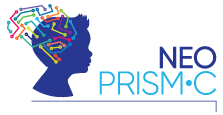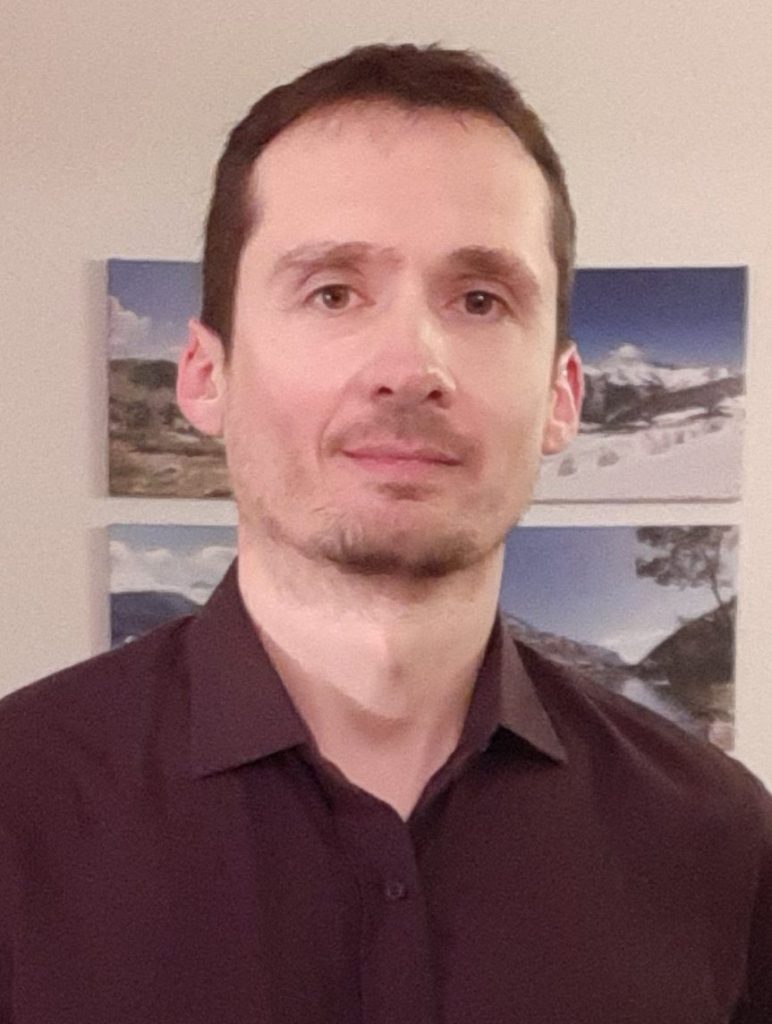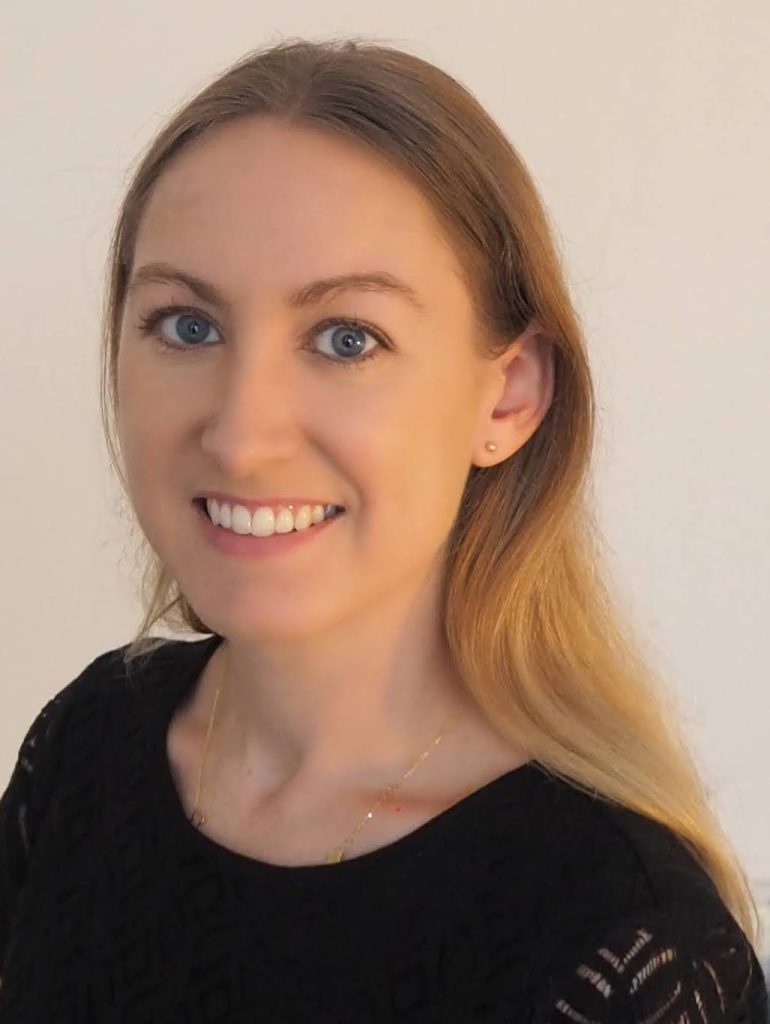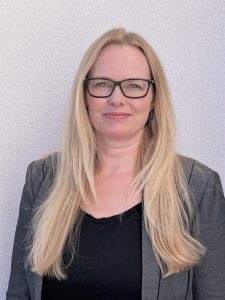5th Training Workshop on Social Processes
Host: University of Edinburgh
Platform: Zoom
March 30 -April 1, 2022
- The workshop is organized in hybrid form via the Zoom platform
- Additional tools are used for Notes and Questions (Jamboard).
- Sessions are 70 minutes long: a 40 mins talk followed by 20 mins breakout group discussion (4-5 breakout rooms) and 10 mins wrap-up.
- The schedule is set at the GMT time zone (UK time.
Invited Speakers
Nicolas Chevalier, Ph.D.
University of Edinburgh
Nicolas Chevalier is a Reader in the Department of Psychology at the University of Edinburgh (Edinburgh, UK). He received his Ph.D. in Psychology in 2008 from the University of Provence (Aix-Marseille, France) and then worked as a post-doctoral research associate at the University of Nebraska (Lincoln, NE, United States) and the University of Colorado (Boulder, CO, United States). His work addresses the neurocognitive mechanisms through which children develop increasingly efficient cognitive control. He is especially interested in how children determine what they need to do and how to best implement cognitive control based on environmental information, available cognitive means and previous experience.
Aja Murray, PhD
University of Edinburgh
Aja Murray’s primary research interests relate to mental health from a lifespan developmental perspective, especially ADHD symptoms and co-occurring issues. She uses longitudinal (multi-country) cohort and ecological momentary assessment (EMA) studies to illuminate mental health from a multi-timeframe and cross-cultural perspective. Recent projects include the ‘Decades-to-minutes’ multi-timeframe study of young adult development and the 8-country ‘Evidence for Better Lives Study’ birth cohort study. She also has a strong interest in quantitative methods development and capacity building.
Hilary Richardson, PhD
University of Edinburgh
Hilary Richardson is a Lecturer in the School of Philosophy, Psychology, and Language Sciences at the University of Edinburgh, where she uses child-friendly neuroimaging studies to learn about children’s social development. In particular, her research asks: what social capacities are available early versus learned or developed gradually? When children show developmental change in their social cognitive capacities, what is the nature of this improvement? What are the relative roles of genes and experience in individual differences and developmental change? By asking these questions, this work informs theories of social cognitive development and addresses basic science questions about the human brain.
Gro Dehli Villanger, Ph.D
Norwegian Institute of Public Health
Gro Dehli Villanger, Ph.D is senior researcher at the Department of Child Health and Development at the , Oslo, Norway. She is a toxicologist and environmental epidemiologist by training. Her research is concerned with the influence of early-life environmental factors on adverse neurodevelopment in children, also involving interplay with genes and other environmental factors (e.g. dietary, socio-economic, and socio-emotional factors). Her research focus is prenatal exposure to environmental toxicants and neurodevelopmental outcomes in children (cognitive functions and neurodevelopment/neurologic disorders as outcomes) using participants and data from the Norwegian Mother, Father and Child Cohort study. She has also a key interest in the role of maternal/child endocrine and epigenetic functioning during early brain development in the origins of mental health disorders, and if contaminant disruption/alterations of these functions could represent underlying mechanisms of toxicant actions.
Agenda
All times are in the Greenwitch Mean Time Timezone (GMT)
Central European Time (CET) is GMT+1 hour
Time GMT | Wednesday 30/3 | Time GMT | Thursday 31/3 | Time GMT | Friday 1/4 |
08:30-10:00 | Supervisory Board Meeting ESRs Parallel Meeting | ||||
10:00-10:20 | Welcome speeches Bonnie Auyeung (UoE) Timothy Papadopoulos (UCY) | 09:30-10:20 | DOC Committee Meeting TRNG & EDU Committee Meeting | ||
10:20-11:30 | Hilary Richardson: Developing a theory of mind: Insights from fMRI studies of children | 10:20-11:30 | Gro Villanger (NIPH): The role of early-life environmental risk factors in the etiologic origins of mental disorders in children and youth | 10:20-11:30 | Nicolas Chevalier (UoE): Toward more optimal coordination of cognitive control with age |
11:30-13:00 | Lunch | 11:30-13:00 | Lunch | 11:30-13:00 | Lunch |
13:00-14:10 | Aja Murray (UoE): An introduction to longitudinal modeling in R: Applications to neurodevelopmental research | 13:00-14:10 | Bonnie Auyeung (UoE):Prenatal maternal inflammation and child development | 13:00-14:10 | Kostas Fanti (UCY): Model-based clustering and psychoneurometric approach as tools informing RDoC |
14:10-14:30 | Break | 14:10-14:30 | Break | 14:10-14:30 | Break |
14:30-15:40 | Aja Murray (UoE): Practical session on longitudinal modeling in R | 14:30-15:40 | Valéria Csépe (RCNS): Risks of preterm birth and its possible consequences in language development | 14:30-15:30 | ESRs Roundtable Discussion Presentation of Progress |
15:40-16:00 | Break | 15:40-16:00 | Break | 15:45-17:15 | Private Tour, by Invisible Cities Edinburgh |
16:00-17:10 | Marios Avraamides (UCY): Entrepreneurial skills: From science to company and IPR | 16:00-17:10 | ESRs Roundtable Discussion Presentation of Progress |
Information
Covid-related rules for Scotland
Last update: 22/10/2021
All travel rules in Scotland ended on 18 March, 4am. Please check www.gov.scot regularly for changes.
Face coverings required for most indoor public spaces and on public transport.
Transport
- Local Buses: all buses accept contactless card payments
a.Airport Buses – Skylink, Airlink (SINGLE – £4.50, RETURN – £7.50)
b.Lothian buses (SINGLE ticket – £1.80, DAY ticket – £4.50)
- Taxis: City Cabs (+44 131 2281211), Central (+44 131 2292468)
- Trains: ScotRail, LNER (stops at Waverley [main station])
Sugested Apps to have
- Google Maps (all transport routes)
- Bus & Tram (to check timings)
- Uber / FreeNow (private hire)
Workshop Locations
Room 7.01, Duglad Stewart Building (3 Charles Street, EH8 9AD)
F29/30, Department of Psychology (7 George Square, EH8 9JZ)
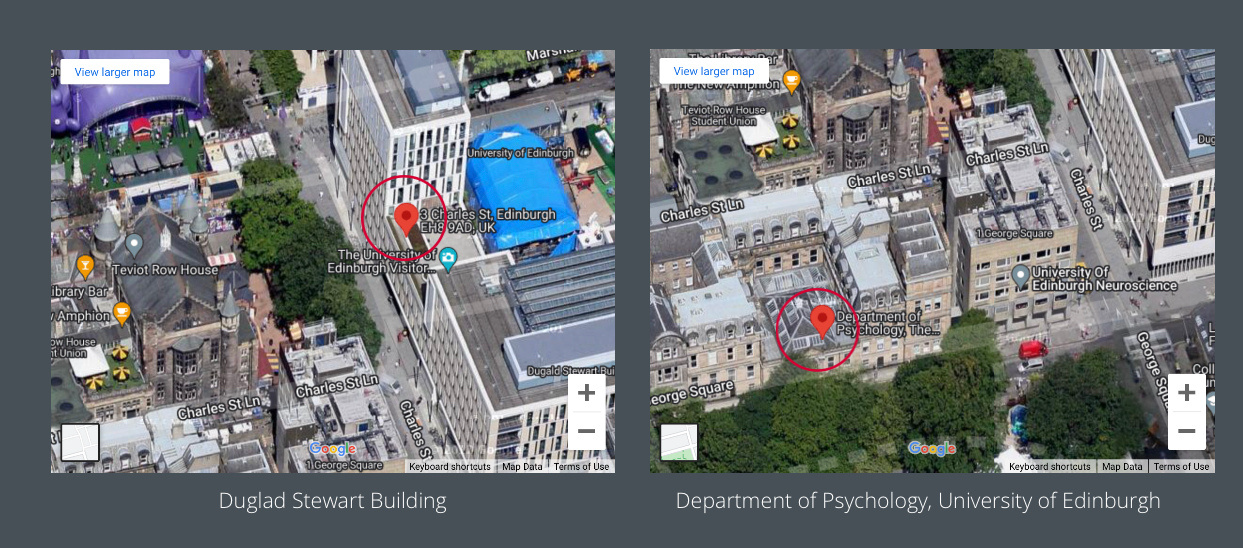
Emergency Numbers
999 or 111 (emergencies)
101 (non-emergencies)
+44 808 8010414 (Edinburgh Crisis Centre – mental health)
Edinburgh Food
Cafe Sugestions
- Black Medicine
- Cheapshot Coffee
- Detour Espresso (south of The Meadows)
- Himalayan Centre, Tibetan Cafe
- Kilimanjaro Coffee
- Lady and the Bear (Greek coffee & pastries)
- Press Coffee
- Union Brew Lab
- Uplands Roast (great hot chocolate)
Lunch/Dinner Sugestions
- Antojitos (Vegan Mexican food)
- Beirut (Lebanese)
- Cafe Andaluz (Spanish Tapas)
- El Cartel (Mexican)
- Elephant and Bagels (British)
- Nanyang Malaysian Restaurant (Malaysian)
- Nile Valley Cafe (African)
- The Library Bar @ Teviot House
- The Outsider
- Ting Thai Caravan (Thai)
- Olly Bongo’s (Mediterranean)
- Pizza Express
- Saboteur (Vietnamese)
- Söderberg @ the Meadows (Swedish)
- Victor Hugo Deli @ The Meadows (Delicatessen)
Local Advice
- Most places accept contactless payments
- Prepare for rain and wind
- Raincoats > umbrellas
- Edinburgh city centre is split into Old Town and New Town
- The University of Edinburgh has five campuses, most ofthem in Old Town area
- Vantage areas of Edinburgh city:
- Arthur’s Seat
- Blackford Hill
- Carlton Hill
- Edinburgh Castle
- Free attractions:
- National Museum of Scotland
- Scottish National Gallery
- Scottish National Portrait Gallery
- Scottish National Gallery of Modern Art
- Royal Botanic Garden
GRANT HOLDER

